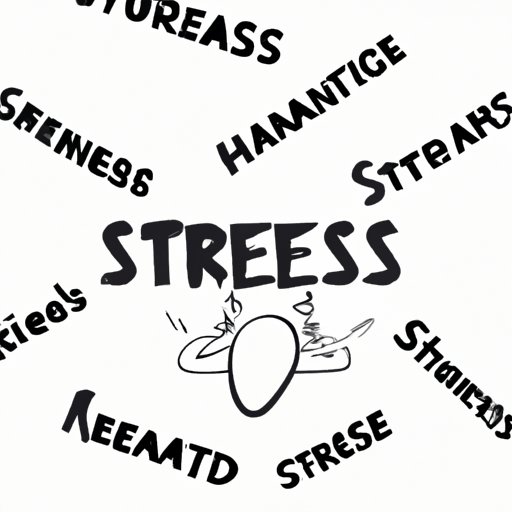Introduction
Stress can be defined as a psychological and physiological reaction to an event or situation that poses a challenge or threat. It is something that everyone experiences at some point, and it can have both positive and negative effects depending on how it is managed. In this article, we will explore the importance of effective stress management for physical and mental health, as well as its effects on interpersonal relationships.
Physical Effects of Stress
When the body is under stress, it releases hormones such as cortisol and adrenaline in order to prepare it for fight-or-flight. This response is useful in short-term situations, as it enables us to respond quickly and effectively. However, if the body is constantly under stress, its systems can become overworked, leading to fatigue, headaches, digestive issues, and other physical symptoms.
Lifestyle changes such as regular exercise, proper nutrition, and adequate sleep can help to manage stress levels and reduce its physical impact. Exercise helps to release endorphins which can improve mood, while also providing a distraction from stressful thoughts. Eating a balanced diet and getting enough rest can also help to keep the body functioning optimally and reduce the effects of stress.
Mental Effects of Stress
Stress can also have a significant impact on our mental health. When the body is in a constant state of alertness, it can be difficult to focus and be productive. High levels of stress can also lead to feelings of anxiety and depression, which can further interfere with day-to-day functioning. If left unchecked, stress can increase the risk of developing more serious mental health conditions such as post-traumatic stress disorder (PTSD) and panic disorder. Additionally, long-term stress has been linked to heart disease, stroke, and other physical health problems.
Relationship Effects of Stress
Stress can also affect interpersonal relationships. When we are feeling overwhelmed or anxious, it can be difficult to connect with others, resulting in conflict or misunderstandings. Stress can also lead to feelings of isolation and loneliness, as it can be hard to reach out for help or support when we are struggling mentally.
Fortunately, there are strategies for managing stress in relationships. Communication is key, as talking openly and honestly with your partner or loved ones can help to build trust and foster understanding. Compromise can also be beneficial in resolving conflicts, as it allows both parties to come to an agreement that works for everyone.
Recognizing When Stress is Becoming Dangerous
It is important to be aware of the signs that stress is reaching a dangerous level. These can include difficulty sleeping, loss of appetite, irritability, and withdrawal from activities or social interactions. If any of these symptoms are present, it may be necessary to seek professional help.
There are several coping mechanisms for dealing with stress, including mindfulness, relaxation techniques, and therapy. Mindfulness involves focusing on the present moment and being aware of one’s thoughts and feelings without judgment. Relaxation techniques, such as deep breathing and progressive muscle relaxation, can help to reduce tension and calm the mind. Finally, therapy can provide a safe space to explore and process emotions, as well as learn new strategies for managing stress.
Testimonials
Many people have experienced the positive benefits of effective stress management. Here are a few stories from individuals who have found relief through different methods:
- “I started doing yoga and meditation to help manage my stress, and it has made a huge difference. I can now stay focused and productive throughout the day, and I no longer feel overwhelmed by my responsibilities.” – John, 31
- “Talking to a therapist has been incredibly helpful in managing my stress levels. I’m learning how to identify my triggers and develop healthier coping mechanisms.” – Sarah, 27
- “I decided to start exercising regularly and eating a balanced diet, and I’ve noticed a big change in how I’m feeling. I now have more energy and motivation, and my stress levels are much lower.” – Mark, 29
Conclusion
In conclusion, effective stress management is essential for maintaining physical and mental health. It is important to be aware of the effects of stress on the body, mind, and relationships, and to recognize when it is becoming dangerous. There are many strategies for managing stress, including lifestyle changes, communication, compromise, mindfulness, relaxation techniques, and therapy. With the right tools and support, it is possible to reduce stress and lead a happier, healthier life.
(Note: Is this article not meeting your expectations? Do you have knowledge or insights to share? Unlock new opportunities and expand your reach by joining our authors team. Click Registration to join us and share your expertise with our readers.)
